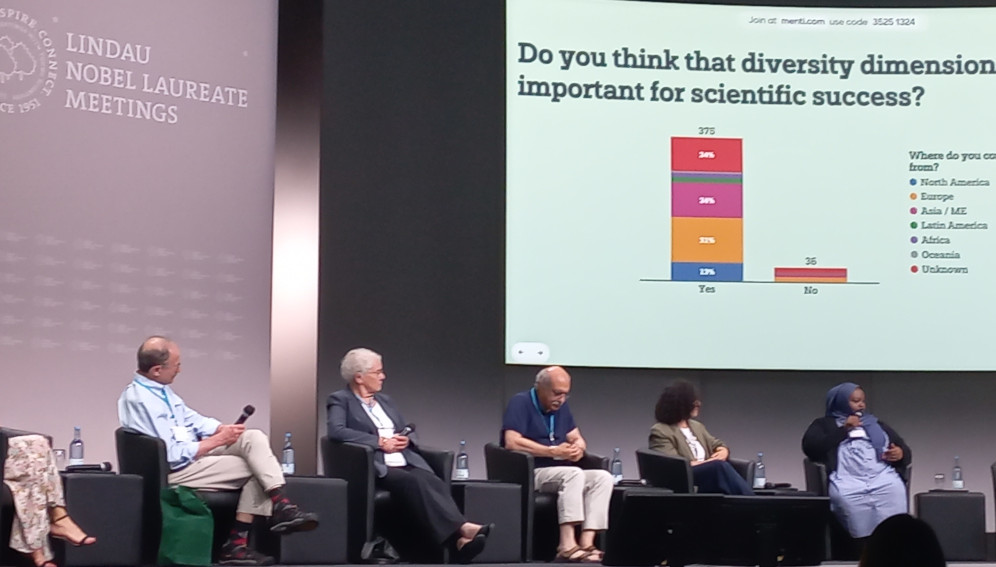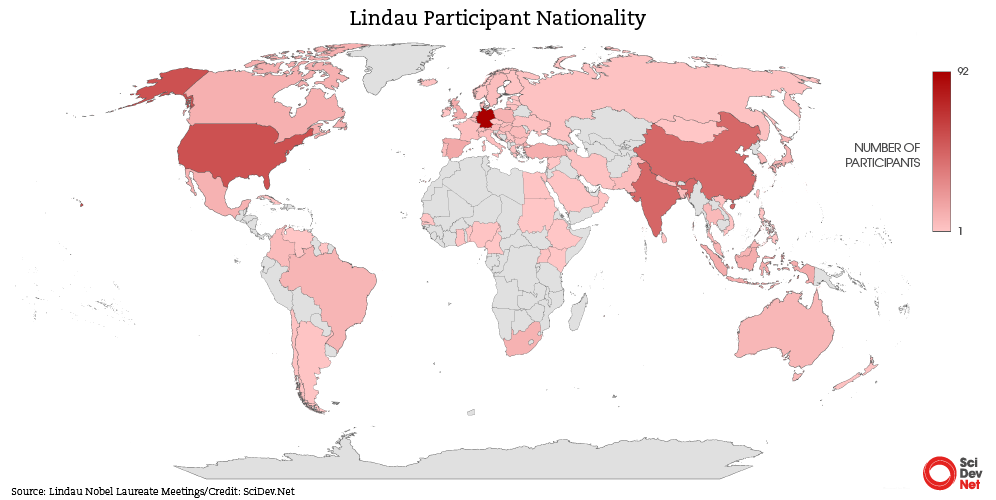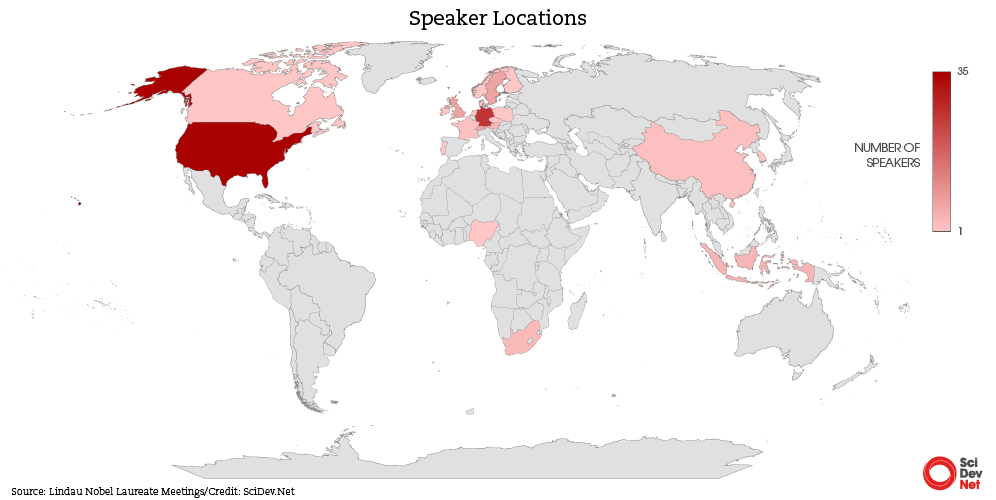07/07/23
Diversity in question at Lindau Nobel laureate meet

By: Mouttasem Albarodi and Daniela Hirschfeld
Send to a friend
The details you provide on this page will not be used to send unsolicited email, and will not be sold to a 3rd party. See privacy policy.
[LINDAU, GERMANY] “I don’t know whether diversity is absolutely necessary for scientific success,” said Christiane Nüsslein-Volhard, a former Nobel prize winner, at the Lindau Nobel Laureate Meeting 2023 in Germany.
“There are many examples of scientists who didn’t interact much and would not need this diversity,” she continued.
The words of the German biologist, who won the 1995 Nobel Prize in Physiology or Medicine, were not the only ones to stoke controversy at the meeting last week (25-30 June), where “diversity” was the theme.
“They talked about everything except diversity.”
Ibrahima Diouf, Senegalese PhD student
Such comments sparked a conversation about the challenges faced by scientists from the global South. And it prompted us at SciDev.Net to delve into the makeup of delegates at the prestigious meeting itself.
The 72nd meeting might be the most diverse in terms of participants’ nationalities since it was established in 1951. But looking at the participation of scientists presenting their work, global South representation remains limited.
Only one Nigerian scientist represented the global South among more than 70 scientists taking part in the main sessions. And among an international delegation of 46 young scientists presenting their research, there were only three from low- and middle-income countries (LMICs), namely South Africa and Indonesia.
Latin American scientists didn’t actively participate in any session, not even the closing panel on climate change and health. This, despite Brazil’s possession of the world’s largest rainforest and its pressing environmental issues.

In conversation with SciDev.Net, several Nobel laureates expressed their dissatisfaction with the comments made by their colleagues regarding diversity. And many young scientists from the global South voiced their concerns.
‘Politics, money, visas, prejudice’
Following Nüsslein-Volhard’s comments, the panel coordinator opened a real-time survey for the audience to share their thoughts on barriers to inclusion in science.
Words such as “politics, money, visa, and prejudice” appeared on the screens.
They highlighted the structural issues hindering diversity and inclusion in science, such as racism, restrictive visa policies, homophobia, publication bias, and lack of funding for global South research projects.
Julia Castro, a Brazilian PhD student specialising in tropical diseases, said the session was “very disheartening”.
She told SciDev.Net that she struggled to secure funding and publish her work due to a lack of interest in diseases that predominantly impact only certain regions in the global South.
Ibrahima Diouf, a Senegalese PhD student in France, lamented: “They talked about everything except diversity.”
Diouf shared with SciDev.Net his personal experience of struggling to obtain a Schengen visa from the French embassy after being accepted for a scholarship at the University of Strasbourg. His passport and visa were withheld for over two months until an influential politician in Senegal reached out to the French ambassador to resolve the issue.
Ihsan Alp Uzay, a young researcher from Turkey, added: “I had hoped they would address the issue of publication bias. Researchers from LMICs are far more likely to face rejection when submitting their work compared to their Western counterparts.”
Heightened tension
Tensions heightened on the third day of the meetings when Swiss chemist Kurt Wüthrich, winner of the 2002 Nobel Prize in Chemistry, voiced his discontent with the meeting’s theme.
“It’s clear from the first day, that science is not going to be the main subject,” he asserted.
“As a male scientist, I can’t help but feel discriminated against in the prevailing atmosphere of this gathering,” he said.
He brandished a copy of a recent newspaper interview in which Nüsslein-Volhard had cautioned against discrimination towards men in research.



Wüthrich later told SciDev.Net: “The important thing is that we discuss that matter we understand and specialise in, and here there is no single Nobel laureate who has done work in this area, therefore I do not think diversity should be the main theme of the meeting.”
Expanding on her comments, Nüsslein-Volhard told SciDev.Net: “For the individual scientist, who is working on a project, the other people around him or her are not important, the project is what matters, otherwise diversity is nice.”
In a statement the Council for the Lindau Nobel Laureate Meetings said it was making a number of recommendations following the discussions, to “support a constructive climate of exchange” for future meetings.
It said this year’s event had included several topics addressing the role of science in society, including an opening panel discussion and two workshops on Diversity and Merits in Science.
The statement concluded: “The Lindau Nobel Laureate Meetings invite participants from over 100 countries to Lindau, beyond barriers of age, nationality, religion, gender, socio-economic status, and whatever else may divide us. The programme is dedicated to dialogue enabling new insights, allowing for novel perspectives, and establishing life-long connections.”
In 2018 the committee began a process of updating its guidelines, emphasising support of all talents as one of its primary goals, after it faced criticism from African researchers over a lack of diversity in the meetings.
Why diversity matters
Lack of diversity could lead to specific topics becoming systematically less studied.
“Diversity matters because people have interests and they are not all the same,” US physician and 2003 chemistry Nobel laureate Peter Agre told SciDev.Net.
“There was a long time were sickle cell disease was not recognised at all by American medicine because there were no trained black physicians.”
Agre described the discussions around diversity in the meetings as superficial and argued that more topics should have been addressed such as “the rise of women in science and how it leads to a better quality of medicine”.
2020 Nobel Medicine laureate Charles Rice says the pandemic taught everyone that we cannot work in regional silos.
“We need global cohesion and equality to deal more efficiently with global health problems, especially with expected changes in diseases epidemiology as a consequence of global warming,” Rice said.
This piece was produced by SciDev.Net’s Global desk.













